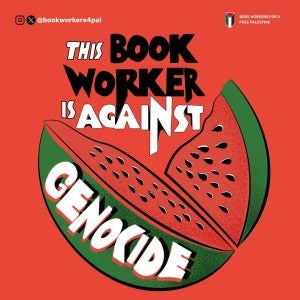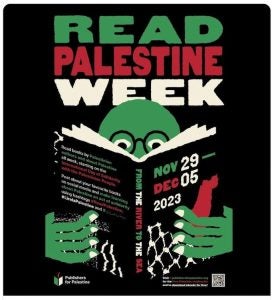
Israel’s Continued Colonial Policy of Eradicating Palestinian Knowledge
By Samar Saeed
“Farewell, my library! Farewell, the house of wisdom, the abode of philosophers, a house and witness for literature! How many sleepless nights I spent there, reading and writing, the night is silent and the people asleep…goodbye, my books! I know not what has become of you after we left: Were you looted? Burnt? Have you been ceremonially transferred to a private or public library? Did you end up on the shelves of grocery stores with your pages used to wrap onions?”
Khalil Sakakini (1878–1953), a Palestinian educator and writer, expelled by Israel from his home in Qatamon, Jerusalem in 1948.
As a PhD candidate researching the Palestinian Revolution during the 1960s and 1970s, my discussions with former revolutionaries, known as the fidayeen, are always marked by their enthusiastic recollections of the books that profoundly transformed their being, thoughts, and imaginations. These books have transported them to other anti-colonial struggles, solidifying their commitment to revolutionary ethos and the liberation of Palestine.
Take Suhayla Bahlwan, an avid reader whose cozy apartment in Amman was filled with old and rare books, periodicals, and novels. As a young woman, she used to return home from her work as a teacher and pour into the works of Socrates, Descartes, Kant, Sartre, deBeauvoir, Camus, Hegel, Marx, and Lenin. Then, after witnessing the devastation and the ethnic cleansing of Palestinians in 1967, Suhayla began voraciously reading Palestinian history. She says that hearing first-hand accounts from Palestinian refugees who arrived in Jordan transformed her life’s trajectory and prompted her to join the Palestinian revolution.
Khadijeh Habashneh, a clinical psychologist and a revolutionary, also underscored the pivotal role of reading in fueling her own commitment to revolutionary struggles. For Khadijeh, liberating the land was tied to liberating one’s mind and soul through the accumulation of knowledge. She loved theater, literature, and history and read everything from Arabic, Russian, and French poetry to political books on the Algerian, Vietnamese, and Cuban Revolutions. Besides her political engagement, Khadijeh authored a book highlighting Palestinian women’s contribution to the revolution, produced two films in Lebanon, and helped establish and document the journey of the Palestinian Cinema Unit, which, in turn, played a major role in documenting the Palestinian revolution.
The experiences of Suhayla and Khadijeh echo a common narrative among the fidayeen I interviewed—that reading had been, for them, an emancipatory practice. Reading expanded their horizons and connected them with other revolutionaries, thinkers, and philosophers, while also arming them with historical facts and theories that informed their revolutionary work and strengthened their commitment to returning to Palestine.
Since its emergence in Palestine in the early twentieth century, the Zionist project has been acutely aware of the transformative power inherent to knowledge and the spaces that safeguard it, such as libraries, archives, and community centers—and has consistently marked these spaces as a threat. Consequently, the Israeli Occupation Forces (IOF) have systematically targeted these spaces, either by bombing and destroying them, looting them, or by falsely depicting them as sites that foster “hate.” This cultural genocide has been well documented by scholars, including Daud Abdullah, whose work charts the intentional and systematic approach adopted by Zionists to erase and destroy Palestinian culture through the theft or outright destruction of books over the past century.
During the 1948 Nakba, Israeli forces looted 30,000 books and manuscripts from the homes of Palestinians expelled from West Jerusalem alone, while the total number of books looted and stolen during that period is estimated at 70,000. They include the private collection of the renowned Palestinian educationist Khalil Al Sakakini, whose lamentation over losing his library opens this article. Other forms of cultural production were looted as well, such as original photographs by Ali Zarour and Ibrahim Rissas, who were among the leading Palestinian photographers in Jerusalem in the early twentieth century. Their stolen collections were discovered later by a lecturer at Tel Aviv University in the Israeli archives.
These acts of destroying Palestinian culture and knowledge did not cease after the Nakba. In 1958, the Israeli authorities ordered the eradication of 27,000 Palestinian textbooks from the pre-1948 period, which were deemed by the state as either useless or threatening, and sold them to a paper plant to turn them to pulp. According to Israeli PhD student Gish Amit, this act was “a cultural massacre undertaken in a manner that was worse than European colonialism, which safeguarded the items it stole in libraries and museums.” Nearly twenty-five years later, during Israel’s 1982 invasion of Lebanon, Israeli forces targeted the Palestinian Liberation Organization (PLO) research center, as well as the Institute for Palestine Studies, a private organization in Beirut. The New York Times cited PLO research center director Dr. Sabry Jiryes, who said Israeli troops stole not only the entire library, which included 25,000 volumes in Arabic, English, and Hebrew, but also their printing press, microfilms, manuscripts, and other archives—smashing filing cabinets and furniture in the process and making off with telephones, heating equipment, and electric fans.
Given this history, the destruction of all universities and many libraries in the Gaza Strip since last October, though shocking in its unprecedented scale, should not be viewed as an aberration. Rather, it represents a continuation of Israel’s colonial policy aimed at obliterating Palestinian knowledge production—at not only erasing its past and present but hindering its future possibilities as well. According to a report by Librarians and Archivists with Palestine, at least 22 archives, museums, and libraries in Gaza were destroyed, damaged or looted by Israeli armed forces between October 2023 and January 2024.
The decimation of Gaza’s libraries began on October 9, 2023, when the IOF leveled the library of the Islamic University of Gaza. The following day, the Samir Mansour Bookshop and Library, which was demolished in 2021 and then rebuilt, was again bombed to the ground. Soon after, the Jawaharlal Nehru Library at Al-Azhar University was destroyed, along with the entire university. On November 25, the Diana Tamari Sabbagh Library in the Rashad al-Shawa Cultural Center was demolished by Israeli shelling, resulting in the loss of tens of thousands of books and the destruction of a building that had been providing refuge to thousands of displaced Palestinians. Two days later, local sources reported that the Gaza Municipal Library caught fire, causing severe damage to the institution. On December 6, six additional scholarly institutions in Gaza City were reported destroyed: the Enaim Library, the Kana’an Educational Development Institute and its community library, the Lubbud Library, Al-Nahda Library, Al-Shorouq Al-Daem Library, and Al-Quds Open University Library. Another grave loss occurred on December 8 with the complete destruction of the 7th-century Omari Mosque, including its library, which housed one of the most significant collections of rare books in Palestine, some dating back to the 14th century. Fortunately, over 200 manuscripts from the library’s holdings were digitized in 2022. Israel’s relentless targeting of Palestinian libraries and other sites of knowledge production continued into the new year. On January 18, a video circulated showing the IOF’s controlled demolition of Al-Israa University, including its library and National Museum, which contained over 3,000 archeological artifacts.

Despite this tragically long list, authors of the report note that Israel’s ongoing bombardment of Gaza, the targeting of journalists, communication blackouts, widespread displacement, as well as the maiming and killing of researchers, librarians, and archivists have made a full accounting of the destruction to knowledge production sites impossible, and that the list is necessarily incomplete. Such obliteration of our artifacts, documents, art, literature, poetry, rare books, memoirs, and archives—what Palestinian scholar Karma Nabulsi referred to back in 2009 as “scholasticide”—not only stands as an irreparable loss, but also prompts a fundamental question: Why would an entity claiming to be “civilized and modern,” juxtaposing itself against the “barbaric and backwards” natives, commit such barbaric and egregious crimes? What is it about Palestinian knowledge production that poses such a threat?
The answer is that the destruction of Palestinian knowledge is a fundamental part of Zionism. From its inception, Zionism propagated a constructed narrative deeming Palestine an empty land devoid of culture, heritage, and history. Palestinians were maliciously portrayed as uncultured, barbaric, and backwards. This racist, orientalist, and distorted perception laid the groundwork for a narrative that sought to institutionalize the erasure of Palestinian existence. Settler colonialism is built on the replacement of one people with another, and this process entails ethnic cleansing that is both bodily and epistemic. It not only aims to kill and annihilate the Palestinian body across historic Palestine and beyond but simultaneously seeks to destroy its physical infrastructure, including its archeology, artifacts, museums, libraries, and archives. According to scholar Kevin Chamberlain “The destruction of a people’s cultural heritage amounts to the destruction of a people’s memory, its collective consciousness and identity. In other words it is ethnic cleansing by another name.” By targeting Palestinian cultural and educational institutions, Zionist settler colonization aims to erase the Palestinian past, present, and the future in order to continue cementing its existence over the ruins and history of the indigenous people.
But, despite the efforts of settler colonialists, people indigenous to occupied lands always resist, and Palestinians are no different—even with the death, loss, and dispossession they have endured for a century. Academic researcher, and PhD candidate Hamzeh Abu Toha, whose house in Beit Lahia, north of the Gaza Strip, was recently bombed by the IOF, wakes up every day amidst the rubble and searches for remnants of his destroyed personal library. Abu Toha, now 27 years old, has spent much of his life amassing precious books from different countries in the region, a challenging process given Israel’s siege on Gaza. Comprised of over 18,000 books spanning history, literature, grammar, morphology, religion, and other subjects, Abu Toha’s library was not just about the physical books, he says, but about “knowledge, history, memories, dedications by authors, and a story of living throughout my life.” Abu Toha ended his interview by pledging to remain on his land, to rebuild his home and library in Gaza, and to open the library to the public. Although the war took “everything from us,” said Abu Toha, “it did not take Gaza from us…Gaza taught us to persevere, sumud.” This determination to remain, to piece together and rebuild the libraries and archives of Palestine’s history for the future embodies the Palestinian love for their land, their commitment to protect and preserve their culture, history, and knowledge, and their insistence to live in spite of Zionist efforts to eradicate Palestinian life.
Samar Saeed, a 2019 graduate of the MAAS program, is currently a PhD candidate in History at Georgetown University.
This article was published in the Fall 2023-Spring 2024 issue of the CCAS Newsmagazine.